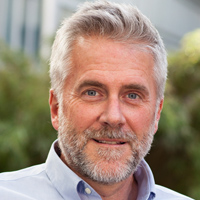Written by:

Executive Director and Head of Bioscience Cardiovascular in Early CVRM, AstraZeneca

Global Product Leader, Late-stage CVRM, AstraZeneca
Cardiomyopathy is a leading cause of heart failure and one of the most frequent reasons for heart transplantation. There are several types of cardiomyopathy and they can have various triggers either acquired or genetic. We are following the science of these diseases to find new treatment options that address the underlying causes of cardiomyopathy so people can live better, healthier lives.
In the video below, discover the story of Richard, age 45, who is living with heart failure caused by cardiomyopathy:
Around the world, millions of people are living life with the limits of cardiomyopathy. For many, diagnosis occurs late once lasting damage has occurred and treatment options are limited to managing the symptoms of heart failure or waiting for a heart transplant. By examining the causes of cardiomyopathy, we are seeking to transform how these diseases are treated so that we can stop progression, treat and one day cure cardiomyopathy.
Cardiomyopathy symptoms and treatments
Cardiomyopathy can describe any one of several illnesses that affect the heart muscle. Common examples include hypertrophic cardiomyopathy, dilated cardiomyopathy and transthyretin amyloid cardiomyopathy. Often it is impossible to establish a specific cause of the disease, some cases are inherited via genetics but many others are thought to be the result of factors such as alcohol consumption, heavy metal exposure, damage causes by certain cancer treatments, coronary artery disease or viral infections.
Notable symptoms of cardiomyopathy include shortness of breath, tiredness and swelling in the feet and ankles. Richard, who features in the video below, was diagnosed with cardiomyopathy after experiencing some of these symptoms. Patients may also develop an irregular heartbeat called arrhythmia. Some cases can be managed through lifestyle changes but many progress to the point of needing an implanted pacemaker or similar devices, or a heart transplant. Understanding the science of cardiomyopathy could reveal ways to stop disease progression and reduce the number of heart transplants that are needed.